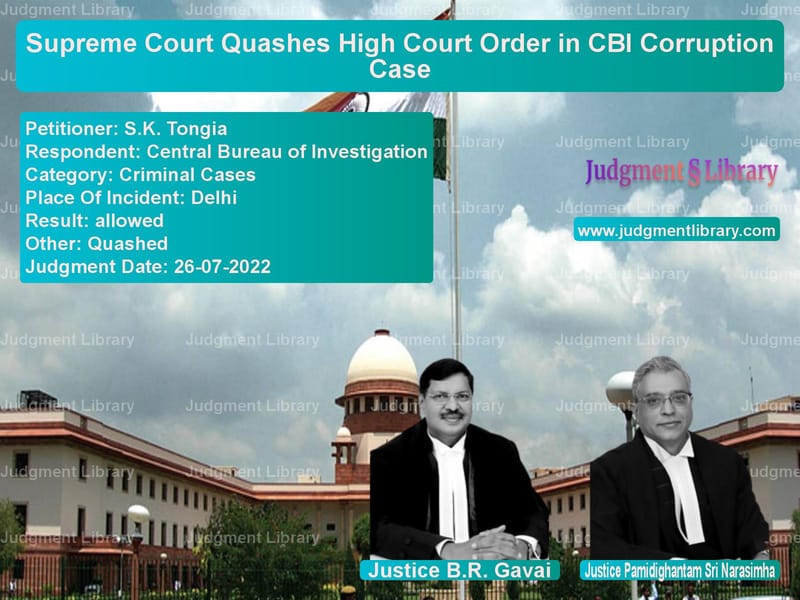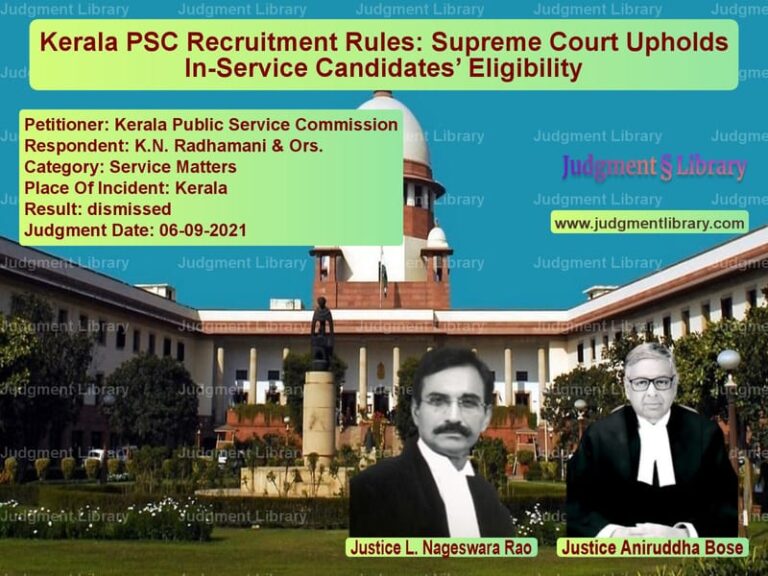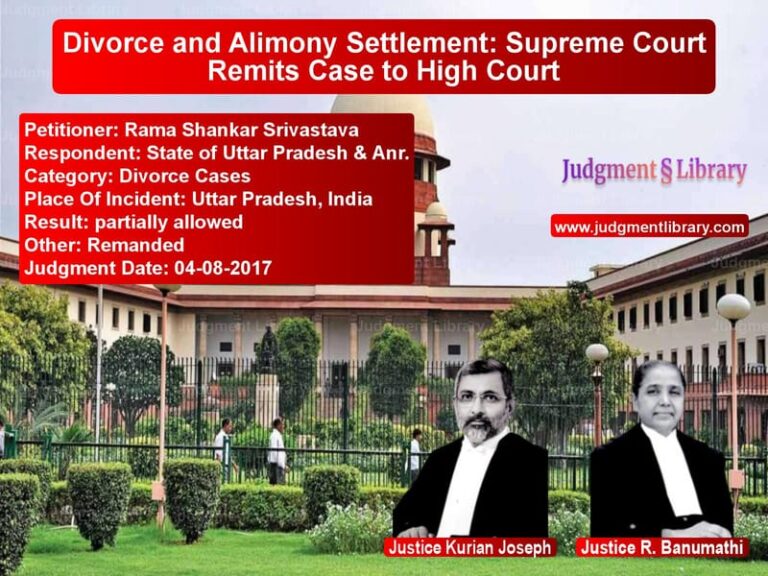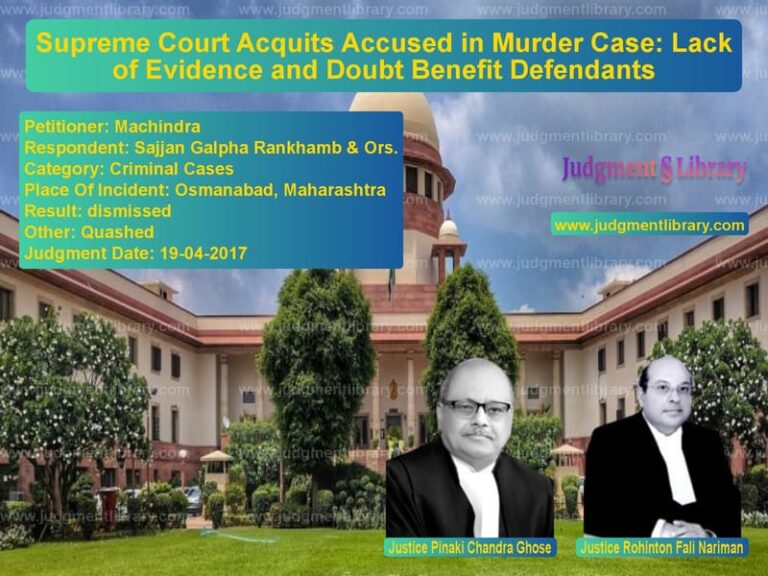Supreme Court Quashes High Court Order in CBI Corruption Case
The Supreme Court of India recently ruled in the case of S.K. Tongia vs. Central Bureau of Investigation, quashing a Delhi High Court order that had reversed the discharge of accused individuals in a corruption case. The judgment emphasized the importance of providing adequate reasoning when overturning a trial court’s decision.
Background of the Case
The case originated from charges framed under the Indian Penal Code (IPC) and the Prevention of Corruption Act, 1988. The Special Judge had discharged the accused, but the Delhi High Court set aside this discharge and remanded the matter back to the trial court.
The appellants, who were discharged by the Special Judge, approached the Supreme Court, arguing that the High Court’s decision lacked sufficient reasoning and deprived them of their acquired right to discharge.
Petitioner’s Arguments (S.K. Tongia & Others)
The petitioners contended:
- The Special Judge had passed a detailed and well-reasoned order concluding that no prima facie case was made out against them.
- The High Court reversed the order without assigning proper reasons.
- If an appellate court reverses a discharge, it must justify why a prima facie case exists against the accused.
- The order took away a valuable right of discharge without legal justification.
- The prosecution failed to provide any new material evidence that could warrant a review of the discharge order.
- The principle of fair trial requires that judicial decisions be based on concrete and compelling evidence rather than conjectures.
- The accused had been subjected to unwarranted scrutiny despite a lack of conclusive evidence.
Respondent’s Arguments (CBI)
The Central Bureau of Investigation (CBI) argued:
- The High Court had only remanded the matter for reconsideration, so no substantial prejudice was caused to the accused.
- The trial court would have the opportunity to assess the case afresh.
- Some crucial evidence, including videography of an inspection by the Medical Council of India, was not initially supplied to the accused.
- The accused had financial transactions that raised suspicions of misappropriation and misuse of power.
- Judicial review should allow examination of corruption-related matters to prevent misuse of public office.
Supreme Court’s Observations
The Supreme Court examined the High Court’s reasoning and observed:
- Though the High Court’s judgment was lengthy, it failed to provide adequate reasoning for reversing the discharge order.
- Overturning a discharge order requires a detailed examination of errors in the trial court’s findings.
- The prosecution had not demonstrated compelling evidence that justified reopening the case.
- The accused had a legally acquired right of discharge, which could not be overturned without due process.
- The burden of proof to establish a corruption offense rests on the prosecution and must be met with conclusive evidence.
- Failure to provide substantial grounds for reversal of discharge violates fair trial principles.
Final Judgment
The Supreme Court ruled:
- The High Court’s order dated 29th July 2019 was quashed.
- The matter was remanded back to the High Court for fresh consideration.
- The High Court was directed to provide a detailed examination of the trial court’s reasoning before reversing the discharge order.
- The rights of the accused to a fair trial and a reasoned discharge order must be upheld.
- Any future appeals must be accompanied by strong, admissible evidence that satisfies legal scrutiny.
Implications of the Ruling
This judgment reinforces key principles:
- Reasoned orders are necessary when overturning discharge decisions.
- The right to discharge must not be taken away without justification.
- Higher courts must engage with the reasoning of trial courts before reversing their findings.
- Judicial oversight ensures protection against arbitrary prosecution.
- Fair trial principles demand well-reasoned decisions at all judicial levels.
- Investigative agencies must present compelling evidence before seeking reversal of discharges.
- Discharges in corruption cases must be reviewed carefully to ensure transparency and fairness.
- Judicial discretion should not be exercised arbitrarily but must follow established legal principles.
- Courts must balance the rights of the accused against the public interest in ensuring accountability in corruption cases.
The Supreme Court emphasized that procedural fairness and a detailed analysis of facts are crucial when dealing with criminal cases. This ruling sets an important precedent ensuring that accused individuals are not arbitrarily deprived of their rights in corruption cases. It underscores the necessity of judicial diligence when reconsidering previously adjudicated matters.
Petitioner Name: S.K. Tongia.Respondent Name: Central Bureau of Investigation.Judgment By: Justice B.R. Gavai, Justice Pamidighantam Sri Narasimha.Place Of Incident: Delhi.Judgment Date: 26-07-2022.
Don’t miss out on the full details! Download the complete judgment in PDF format below and gain valuable insights instantly!
Download Judgment: s.k.-tongia-vs-central-bureau-of-in-supreme-court-of-india-judgment-dated-26-07-2022.pdf
Directly Download Judgment: Directly download this Judgment
See all petitions in Fraud and Forgery
See all petitions in Bail and Anticipatory Bail
See all petitions in Judgment by B R Gavai
See all petitions in Judgment by P.S. Narasimha
See all petitions in allowed
See all petitions in Quashed
See all petitions in supreme court of India judgments July 2022
See all petitions in 2022 judgments
See all posts in Criminal Cases Category
See all allowed petitions in Criminal Cases Category
See all Dismissed petitions in Criminal Cases Category
See all partially allowed petitions in Criminal Cases Category







